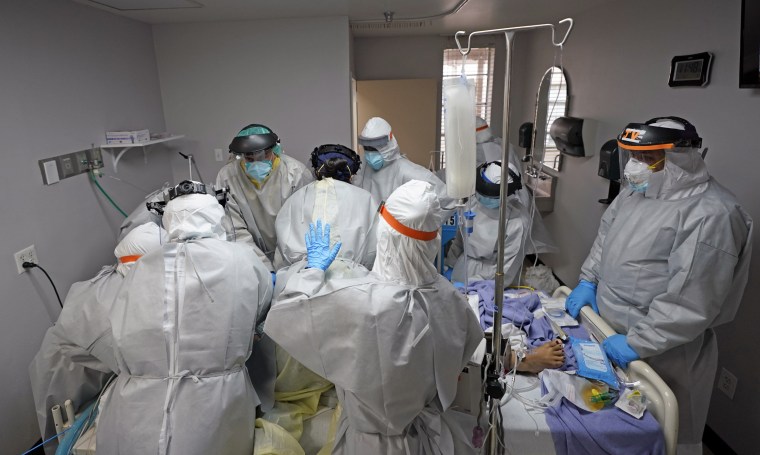The daily COVID-19 death toll in the United States topped 1,000 Tuesday, a grim threshold that's been met four times already within the past month, suggesting that the decline in deaths seen in May and June is reversing.
"That's basically two to three airplanes' worth of people crashing" in a single day, said Dr. Josh Denson, a pulmonary medicine and critical care physician at the Tulane Medical Center in New Orleans. "It's insane."
Full coverage of the coronavirus outbreak
The increase in deaths follows a pattern seen earlier in the pandemic: First, case counts rose. Then, hospitalizations went up. Deaths followed.
That's what's taking place in Houston, where COVID-19 cases have been rising steadily since mid-June.
"In April and May, we had between 200 and 300 cases diagnosed in the greater Houston area on any given day. Now we're around 2,400," said Dr. James McDeavitt, senior vice president and dean of clinical affairs at the Baylor College of Medicine in Houston.
In June, many of those new cases were among younger adults in their 20s, 30s and 40s — a population that is generally less vulnerable to severe complications from the illness, and death. That increase appears to have transformed into an increase in hospitalizations and deaths, but within an older population.
"What we saw after about two weeks was the older population starting to catch up again," McDeavitt said, though he pointed out that there is no scientific data yet to link younger partiers with older patients.
"Presumably, younger people were going out and getting infected, and then bringing that back to parents and grandparents," he said.
"Young people are generally fine," said Dr. Michael Wasserman, a geriatrician and president of the California Association of Long Term Care Medicine. "They're not always, but if they give it to grandma, that's a problem."
Indeed, McDeavitt said, more severe outcomes still tend to be among older people and people with underlying conditions such as obesity, type 2 diabetes and high blood pressure.
The elderly at risk
The recent spike in cases has those who care for older adults concerned.
"It's frightened the daylights out of me," Wasserman said. "I don't want to see more older adults die again."
It's been well documented that the risk for COVID-19 complications and death increases with age, and it's no surprise that frail people with compromised immune systems are vulnerable.
"The greatest risk for severe illness from COVID-19 is among those aged 85 or older," the Centers for Disease Control and Prevention's website says.
But other factors beyond age and health condition also increase the risk among the elderly.
People in nursing homes or assisted living facilities, for example, can't self-isolate. They "need people to move them or do their bathing," Wasserman said. "The more time staff has to spend with residents, it's going to increase the risk for exposure to the virus."
What's more, older adults are more likely to have dementia, which might mean they're unlikely to isolate in their rooms, wear a mask or wash their hands regularly — three cornerstones of infectious disease control.
A "survivable illness"
While there have been advances in COVID-19 therapies, such as the antiviral remdesivir and the steroid dexamethasone, critical care physicians point out there is still no cure for the disease.
Among therapeutics, Denson said, "there's definitely no game-changer" yet.
He recalled a day last week when things were going badly in the COVID-19 intensive care unit. A young patient in his 30s died; a language barrier made conversations with the patient's family difficult; another patient had unforeseen complications.
Download the NBC News app for full coverage of the coronavirus outbreak
"It was very tough," Denson said. But that very afternoon, he got a call out of the blue from a former patient who nearly died of the virus several times during her hospital stay.
"She was as critically ill as any patient I've had," Denson said. "But she survived, called me from her house, doing great, and just wanted to say 'hello' and 'thank you.'"
It was an uplifting reminder that despite the worrisome rise in cases and in deaths, many people do, in fact, recover from COVID-19.
"It's a very survivable illness," Denson said.
Still, until a vaccine or more effective treatment is available, the key moving forward, he and other experts said, is prevention: Remain vigilant about face coverings and physical distancing.
Those are "our only weapons right now, the only things controlling the virus," McDeavitt said. "If we get past this surge, and we revert to old behaviors and take those weapons off the table, we're going to have another surge."
"Let's learn this lesson."
Follow NBC HEALTH on Twitter & Facebook.

